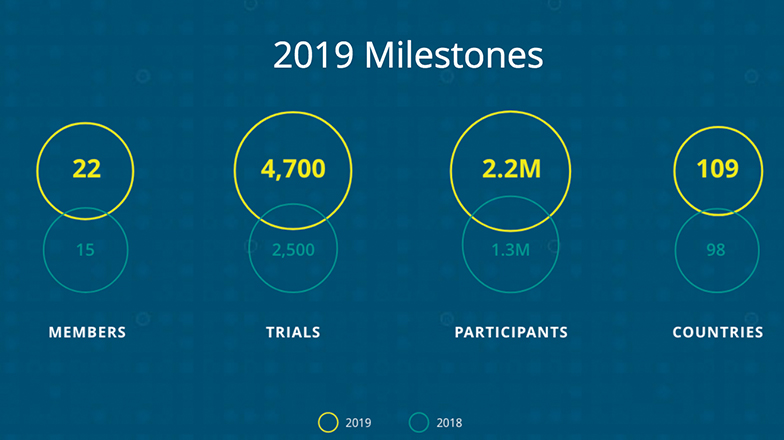Global research nonprofit CureDuchenne joins Vivli to share clinical trial data for treating muscular dystrophy.
CureDuchenne, the leading global nonprofit focused on finding a cure for Duchenne  muscular dystrophy, will contribute patient-level clinical data to the Vivli platform, making it available to other researchers around the world. The data will augment existing studies that are available to request on the Vivli platform, which currently hosts data from over 4,700 trials.
muscular dystrophy, will contribute patient-level clinical data to the Vivli platform, making it available to other researchers around the world. The data will augment existing studies that are available to request on the Vivli platform, which currently hosts data from over 4,700 trials.
Duchenne is the most common and lethal form of muscular dystrophy. Nearly 15,000 boys are living with the disease in the United States alone and over 300,000 worldwide.
“We’re committed to sharing data as a way to fuel treatment breakthroughs for muscular dystrophy. Vivli makes that possible.” said Debra Miller, founder and CEO, CureDuchenne.
CureDuchenne will make available individual participant data collected, after deidentification, from phase 2 and phase 3 clinical trials of the drug drisapersen, as well as observational studies.
“We’re delighted to have CureDuchenne join as a member of Vivli and make this valuable data available. We welcome researchers interested in Duchenne to visit the Vivli platform to access these datasets and potentially uncover new insights in muscular dystrophy,” said Rebecca Li, Vivli Executive Director. “The Vivli platform is a secure and user-friendly place to store and share data from clinical trials regardless of sponsor, and we look forward to welcoming more nonprofit research entities to Vivli.”
About Vivli
Vivli is a non-profit organization working to advance human health through the insights and discoveries gained by sharing and analyzing data. It is home to an independent global data-sharing and analytics platform which serves all elements of the international research community. The platform includes a data repository, in-depth search engine and cloud-based analytics, and harmonizes governance, policy and processes to make sharing data easier. Vivli acts as a neutral broker between data contributor and data user and the wider data sharing community. For more information, visit www.vivli.org and follow us on Twitter @VivliCenter. Watch the video on why data re-use matters: https://www.youtube.com/watch?v=NVqK8VCnk9Y
About CureDuchenne
CureDuchenne is the nation’s leading nonprofit organization dedicated to finding a cure for Duchenne, the most common and lethal form of muscular dystrophy. As the leading genetic killer of young boys, Duchenne affects more than 300,000 boys living today. CureDuchenne has garnered international attention for its efforts to raise funds and awareness for Duchenne through venture philanthropy. For more information on how to help raise awareness and funds needed for research, please visit www.cureduchenne.org.


 muscular dystrophy, will contribute patient-level clinical data to the Vivli platform, making it available to other researchers around the world. The data will augment existing studies that are available to request on the Vivli platform, which currently hosts data from over 4,700 trials.
muscular dystrophy, will contribute patient-level clinical data to the Vivli platform, making it available to other researchers around the world. The data will augment existing studies that are available to request on the Vivli platform, which currently hosts data from over 4,700 trials. other members to securely share their studies with researchers,” said Rebecca Li, Vivli Executive Director.
other members to securely share their studies with researchers,” said Rebecca Li, Vivli Executive Director. which highlights our milestones to date and plans for the year ahead.
which highlights our milestones to date and plans for the year ahead. Vivli, the Multi-Regional Clinical Trials Center (MRCT Center) and Association of American Medical Colleges (AAMC) present a discussion on methodologies for appropriating credit in data sharing. Dr. Barbara Bierer, MRCT Center Faculty Director, and Heather Pierce, Senior Director of Science Policy for AAMC share how purpose-driven data sharing both enhances scientific discovery and ensures data generators receive credit for their work. The webinar will be held Tuesday, November 12th at 11am EST.
Vivli, the Multi-Regional Clinical Trials Center (MRCT Center) and Association of American Medical Colleges (AAMC) present a discussion on methodologies for appropriating credit in data sharing. Dr. Barbara Bierer, MRCT Center Faculty Director, and Heather Pierce, Senior Director of Science Policy for AAMC share how purpose-driven data sharing both enhances scientific discovery and ensures data generators receive credit for their work. The webinar will be held Tuesday, November 12th at 11am EST.